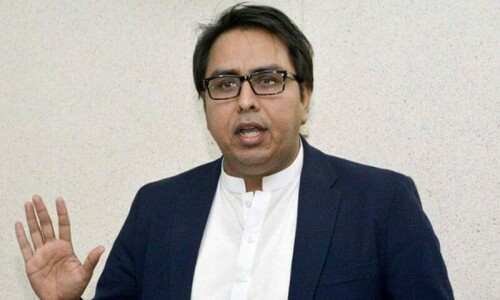LAHORE, Sept 22: Speakers at a seminar on Saturday called for early notification and implementation of the new visa regime Pakistan and India had recently come up with.
“Signatories to peace convention: towards a prosperous Pak-India future” was the theme of deliberations arranged by the Institute for Peace and Secular Studies. The event brought together peace activists, parliamentarians and students from both countries.
The participants shared their reservations that the tedious process for getting a visa had yet to be fully relaxed, police reporting still existed and no measures had been taken to facilitate students, artists, divided family members (other than husband and wife) and ordinary citizens.
The first session discussed the history of the struggle for normalisation of relations and people-to-people contact, with Dr Mubarak Ali, Dr Mehdi Hassan, Mr Husain Naqi and Sandeep Pandey (Founder ASHA for Education) discussing historical baggage of wars and how peace activists on both sides struggled to stay connected and bring both countries towards better relations.
The speakers during the next session on “Assessing the new visa regime through arts, education and economy” read the Relax Visa Regime Resolution which demanded a three-staged process eventually leading to a visa upon entry.
The resolution demanded announcement of the exact implementation date of the new visa regime, opening of borders other than Wagah for the convenience of ordinary citizens, liberalising the tedious visa application requirements, facilitating the youth to avail themselves of Saarc scholarships and removal of all aspects of hate and angst from the daily flag-lowering ceremony at the Wagah Border.
In the third session -- Struggle for the Future, parliamentarians and civil society activists like Zafar Sahi (PML-Q), Sajida Mir (PPP) and Sitish Agarwal (Indian peace activist) discussed ways to enhance cooperation at the national as well as provincial (both Punjabs) levels for the benefit of the citizens.
They agreed that dialogue and cooperation was the only way forward and that time was of the essence if South Asia wanted to decrease its poverty levels and prosper like other world regions. They added their names among the signatories to peace. The convention concluded with the statement of goals for next year.
Saeeda Diep, Director IPSS while reading the petition stated that the organisation had collected more than 85,000 signatures of Pakistani citizens over the last eight months whereas an Indian partner organisation had done the same on the Indian side.
She stated that campaign experience in Lahore, Multan, Pakpattan, Faisalabad and Okara showed that an overwhelming majority of Pakistani citizens wanted peace with India and supported dialogue to resolve all outstanding issues.













































Dear visitor, the comments section is undergoing an overhaul and will return soon.